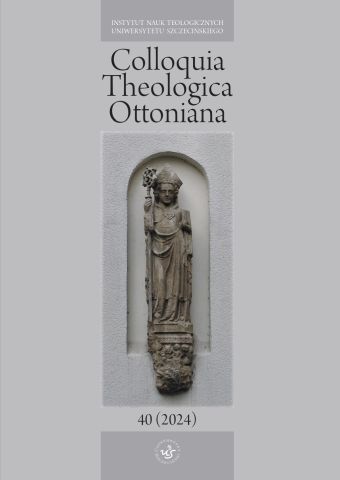
ISSN: 1731-0555
eISSN: 2353-2998
OAI
DOI: 10.18276/cto.2024.40-07




Issue archive /
40/2024
Spekulatywne Boże Narodzenie
(Speculative Christmas)
| Authors: |
Stanisław
Judycki

Uniwersytet Gdański, Polska | Instytut Filozofii |
| Keywords: | nature of God omniscience omnipotence humility Incarnation destiny of human persons |
| Whole issue publication date: | 2024-12-10 |
| Page range: | 24 (131-154) |
Abstract
The article addresses the following issues: 1. In what sense can the creation of the world by God be considered His incarnation? 2. In what sense should the traditional Christian doctrine of creatio continua be considered a theory of God’s permanent incarnation? 3. Should the creation of human and non-human persons be considered a kind of incarnation of God? 4. Doesn’t God’s omniscience, which includes all possible and actual evil, compel God’s incarnation as a test of humility? 5. Doesn’t the attribute of omnipotence possessed by an ideally good God lead Him to maximum pride, and hence, doesn’t it force Him to test of humility, which, according to Christian theology and philosophy, was the incarnation of the second Person of the Holy Trinity? 6. What is their relationship to each other: the Kingdom of God and the world of created human and non-human persons?
Download file
Article file
Bibliography
| 1. | Allen S.R., A Critical Introduction to Properties, Bloomsbury, London 2016. |
| 2. | Bachelard G., La poétique de l’espace. Troisième Édition, Presses Universitaires de France, Paris 1961. |
| 3. | Borghini A., A Critical Introduction to the Metaphysics of Modality, Bloomsbury, London 2016. |
| 4. | Dunnington G.W., Carl Friedrich Gauss: Titan of Science, Hafner, New York 1955. |
| 5. | Goethe J.W., Faust, przeł. F. Konopka, Państwowy Instytut Wydawniczy, Warszawa 1977. |
| 6. | Hartmann N., Ethik, Walter de Gruyter, Berlin ³1949. |
| 7. | Hegel G.W.F., Glauben und Wissen, w: H. Brockard, H. Buchner (red.), Jeaner kritische Schriften (III), Felix Meiner Verlag, Hamburg 1986, s. 413–414. |
| 8. | Hösle V., Einführung, w: C. Lohr (red.), Raimundus Lullus. Die neue Logik. Logica Nova, Meiner, Hamburg 1985, s. X–LXXXVI. |
| 9. | Judycka J., Wiara i rozum w filozofii Rajmunda Lulla, Wydawnictwo KUL, Lublin 2005. |
| 10. | Judycki S., Epistemologia. t. 2, Wydawnictwo W drodze – Instytut Tomistyczny, Poznań–Warszawa 2020. |
| 11. | Judycki S., Wszechmoc i istnienie, „Diametros” 21 (2008), s. 30–62, www.diametros.iphils.uj.edu.pl, [przedruk w: Teologia filozoficzna. Wokół książki Stanisława Judyckiego Bóg i inne osoby, red. J. Pyda, W drodze, Poznań–Kraków 2013, s. 193–234]. |
| 12. | Kobe Z., Die Auferstehung des Begriffs aus dem Geiste des Nihilismus oder Hegels spekulativer Karfreitag, „Filozofski Vestnik“ 26 (2005) 2, s. 113–128. |
| 13. | Lehman K., Zwischen Glauben und Wissen. Der Spekulative Karfreitag, „Hegel-Jahrbuch” 5 (2003) 1, s. 18–26. |
| 14. | Lewis D.K., On the Plurality of Worlds, Blackwell, Oxford 1986. |
| 15. | Leftow B., Tempting God, „Faith and Philosophy: Journal of the Society of Christian Philosophers” 31 (2014) 1, s. 3–23. |
| 16. | McDaniel K., The Fragmentation of Being, Oxford University Press, Oxford 2017. |
| 17. | Murray M.J., Rea M., Philosophy and Christian Theology, w: E.N. Zalta (red.), The Stanford Encyclopedia of Philosophy (Fall 2021 Edition), https://plato.stanford.edu/archives/fall2021/entries/christiantheology-philosophy/. |
| 18. | Norwid C.K., Bema pamięci żałobny rapsod, w: T. Pini (red.), Dzieła Cypriana Norwida, W.L. Anczyc, Warszawa 1934. |
| 19. | Pittard J., Worship and the Problem of Divine Achievement, „Faith and Philosophy: Journal of the Society of Christian Philosophers” 38 (2021) 1, s. 65–90. |
| 20. | Platon, Sofista, Polityk, przeł. W. Witwicki, Wydawnictwo Antyk, Kęty 1999. |
| 21. | Przanowski M., Uniżony Bóg w myśli św. Tomasza z Akwinu, Wydawnictwo Naukowe Uniwersytetu Mikołaja Kopernika, Toruń 2018. |
| 22. | Pismo Święte Starego i Nowego Testamentu, Wydawnictwo Pallottinum, Poznań–Warszawa 1971. |
| 23. | Scheffczyk L., G.W.Fr. Hegels Konzeption der „Absolutheit des Christentums” unter gegenwärtigen Problemaspekt, Verlag der Bayerischen Akademie der Wissenschaften, München 2000. |
| 24. | Schäfer R., Absolutheit des Christentums, w: J. Ritter (red.), Historisches Wörterbuch der Philosophie, Schwabe & CO Verlag, Basel–Stuttgart 1971, kol. 31–32. |
| 25. | Troeltsch E., Die Absolutheit des Christentums und die Religionsgeschichte (1901/1902), mit den Thesen von 1901 und den handschriftlichen Zusätzen, red. T. Rendtorff, Walter de Gruyter, Berlin–New York 1998. |